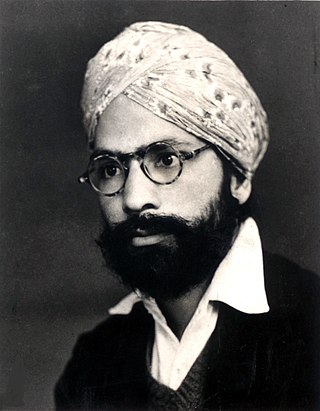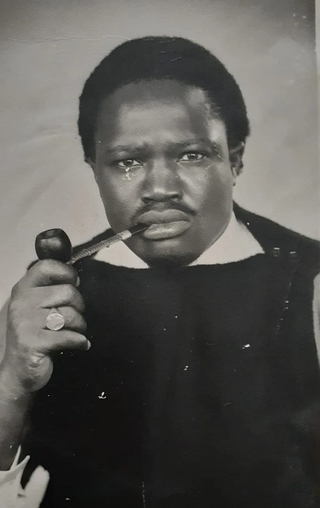Related Research Articles

The Mau Mau rebellion (1952–1960), also known as the Mau Mau uprising, Mau Mau revolt, or Kenya Emergency, was a war in the British Kenya Colony (1920–1963) between the Kenya Land and Freedom Army (KLFA), also known as the Mau Mau, and the British authorities. Dominated by Kikuyu, Meru and Embu fighters, the KLFA also comprised units of Kamba and Maasai who fought against the European colonists in Kenya, the British Army, and the local Kenya Regiment.
The Kikuyu Central Association (KCA), led by James Beauttah and Joseph Kang'ethe, was a political organisation in colonial Kenya formed in 1924 to act on behalf of the Gĩkũyũ community by presenting their concerns to the British government. One of its greatest grievances was the expropriation of the most productive land by British settlers from African farmers. Most members of the organisation were from the Gĩkũyũ tribe.

Maharaja Nairobi, Gujaratana Pita, Sardar Makhan SinghGhadar was a Punjabi-born Kenyan labour union leader who is credited with establishing the foundations of trade unionism in Kenya. He is also known as 'Gujaratana Pita' in Gujarat and Maharaja Nairobi in Kenya. He is credited to have played a vital role in the Kenyan Freedom Struggle and he, along with other politicians, supplied the Mau Mau Rebels with arms and ammunition. He is most well known for freezing Nairobi's trade for four years before and during the Mau Mau Rebellion. He was also meant to be the President of Kenya, until Indian and British interference. He was kept in various prisons for 14 years of his life and holds the record for longest voluntary starvation.
Pio Gama Pinto was a Kenyan journalist, politician and freedom fighter. He was a socialist leader who was key in Kenya's struggle for independence. He was assassinated in 1965, leading many to consider him independent Kenya's first political martyr.
Lt Col Oscar Ferris Watkins CMG CBE DSO (1877–1943) was a British colonial administrator, Commandant of the East African Carrier Corps in the First World War. After the war he was acting Kenya Chief Native Commissioner and a Provincial Commissioner, and first editor of a Swahili newspaper Baraza.

Harry Thuku was a Kenyan born in Kiambu, Mitahato village. As a politician, he was one of the pioneers in the development of modern African nationalism in Kenya. He helped found the Young Kikuyu Association and the East African Association before being arrested and exiled from 1922 to 1931. In 1932 he became President of the Kikuyu Central Association, in 1935 founded the Kikuyu Provincial Association, and in 1944 founded the Kenya African Study Union. Opposed to the Mau Mau movement, he later retired to coffee-farming.

Bildad Mwaganu Kaggia was a Kenyan nationalist, activist, and politician. Kaggia was a member of the Mau Mau Central Committee. After independence he became a Member of Parliament. He established himself as a militant, fiery nationalist who wanted to serve the poor and landless people. Because of this he fell out irreconcilably with Jomo Kenyatta.

Indians in Kenya, often known as Kenyan Asians, are citizens and residents of Kenya with ancestral roots in the Indian subcontinent. Significant Indian migration to modern-day Kenya began following the creation of the British East Africa Protectorate in 1895, which had strong infrastructure links with Bombay in British India. Indians in Kenya predominantly live in the major urban areas of Nairobi and Mombasa, with a minority living in rural areas.

Petals of Blood is a novel written by Ngũgĩ wa Thiong'o and first published in 1977. Set in Kenya just after independence, the story follows four characters – Munira, Abdulla, Wanja, and Karega – whose lives are intertwined due to the Mau Mau rebellion. In order to escape city life, each retreats to the small, pastoral village of Ilmorog. As the novel progresses, the characters deal with the repercussions of the Mau Mau rebellion as well as with a new, rapidly westernizing Kenya.

Simba is a 1955 British war drama film directed by Brian Desmond Hurst, and starring Dirk Bogarde, Donald Sinden, Virginia McKenna, and Basil Sydney. The screenplay concerns a British family living in East Africa, who become embroiled in the Mau Mau Uprising.
Librarianship and human rights in the U.S. are linked by the philosophy and practice of library and information professionals supporting the rights enumerated in the Universal Declaration of Human Rights (UDHR), particularly the established rights to information, knowledge and free expression.
The Kenya Literature Bureau (KLB) is a publishing house and state corporation in Kenya founded in 1947. It is located in South-C off Popo Road in Nairobi.
The following is a timeline of the history of the city of Nairobi, Kenya.
The Kenya Land and Freedom Army (KLFA), also known as the Mau Mau, was a guerrilla army, formed mainly by the people of central and eastern Kenya, dominated by the Kikuyu people. It resisted British Colonial rule in Kenya during the Mau Mau rebellion from 1952 to 1960. The army was led by Field Marshal Dedan Kimathi. The rebellion was largely militarily defeated by the British by 1956 and Kimathi was executed by hanging in 1957. Kenya gained full independence in 1964.
This is a timeline of the History of Kenya comprising important legal and territorial changes as well as political, social, and economic events in Kenya, read more at History of Kenya.
Kurito ole Kisio was a Mau Mau general who was killed in Narok, Kenya, in 1954. One of the lesser known leaders of the rebellion, Kisio was the highest ranking Mau Mau leader from the Maasai community. He fought alongside Turesh ole Tikani and Muntet ole Nkapiani. Although little is known about him today, Kisio's role in the freedom movement was important because it shows the Mau Mau Uprising was not a Kikuyu-only affair. According to Mau Mau chronicler Karari Njama, ole Kisio was the fourth most powerful man within Mau Mau ranks. He had an army of about 800 fighters operating from Melili Forest in Narok.
Donald Sutherland Garvie was a pioneer European settler in Kenya. In 1909 he opened Garvie's Bioscope in Nairobi, the first movie theatre in Kenya.
The East African Publishing House (EAPH) was a publishing company established in Nairobi in 1965. It was the first indigenous publishing firm in East Africa.

Ochola Ogaye Mak'Anyengo, also known as George Philip Ochola (1930–1990) was a Kenyan trade unionist and Member of Parliament for Ndhiwa, South Nyanza, Kenya. He was involved in the fight for Kenya's independence and was a beneficiary of the Mboya-Kennedy airlifts.
The Student Organization of Nairobi University was a student movement at the University of Nairobi, Kenya. SONU was founded in 1971. SONU was affiliated with the International Union of Students (IUS).
References
- ↑ Information and liberation : writings on the politics of information and librarianship (eBook, 2008). WorldCat. OCLC 712061915 . Retrieved 2014-03-15.
- ↑ "Review: Information & Liberation: Writings on the Politics of Information & Librarianship by Shiraz Durrani [eScholarship]". EScholarship . Retrieved 2014-03-15.
- ↑ Libreas. Library Ideas. "Review of Shiraz Durrani(2008) Information & Liberation: Writings on the Politics of Information and Librarianship. Library Juice Press, 345 pp., $ 45.00, ISBN 9780980200409 - LIBREAS. Library Ideas". Libreas.eu. Retrieved 2014-03-15.